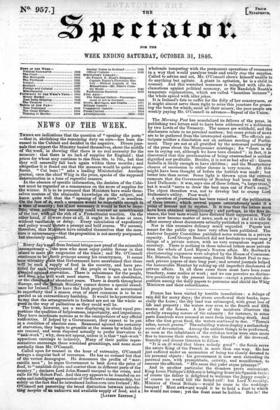The Morning Post has scandalized its fellows of the press,
in publishing two letters said to have been addressed to a nobleman by two Lords of the Treasury. The names are withheld, and the disclosures relate to no personal matters; but some points of news are to be gathered from the intercepted epistles. The officials an:- ticipate neither a dissolution nor an autumn meeting of Parlia- ment. They are not at all gratified by the untoward pertinacity of the press about the Montpensier marriage; for "there is no use in crying out although we have been cheated": in fact, it is discovered that this proclamation of being overreached is neither dignified nor profitable. Besides, it is not so bad after all : Queen Isabella is likely enough to have children ; and the Montpensier chance of succession to either throne is very remote. All this might have been thought of before the hubbub was made ; but better late than never. Some light is thrown upon the current rumours that the Governorship of Bombay had been offered to Lord Dalhousie : it was, says one of these letters, "a large trout,', but it would "serve to draw the best man out of Peel's camp." The object therefore was, not to develop but to cramp Lord Dalhousie's utility. Poor work ! A question of journalism has been raised out of the publication of these letters; which several papers ostentatiously make it a point of honour not to reprint. It is true that the letters must have been obtained surrepatiously ; and perhaps, in the first in- stance, the best taste would have dictated their suppression. They have now become matter of news, such as it is ; and it is idle to affect secrecy about documents actually published in a newspaper. Nor is this excessive delicacy much regarded. Papers not meant for the public eye have very often been published. The Andover Inquiry Committee published notes written in a private capacity. Lord George Bentinck did not hesitate to expose man y things of a private nature, with no very scrupulous regard to accuracy. There is nothing in these tabooed letters more private than the whole of Lord. Ripon's Nocton-affair. Mr.- Roebuck's electioneering exposures were adopted by the House of Commons. Mr, Disraeli, the House assenting, forced Sir Robert Peel to ran- sack private papers of date long past ; and several journals helped the honourable Member by raking up old imperfect disclosures of private affairs. In all these cases there must have been some treachery, some malice at work and we can perceive no distinc- tive peculiarity in the present instance—except a prevalent dis- position among the daily papers to patronize and. shield the Whig Ministers and their subordinates.


























